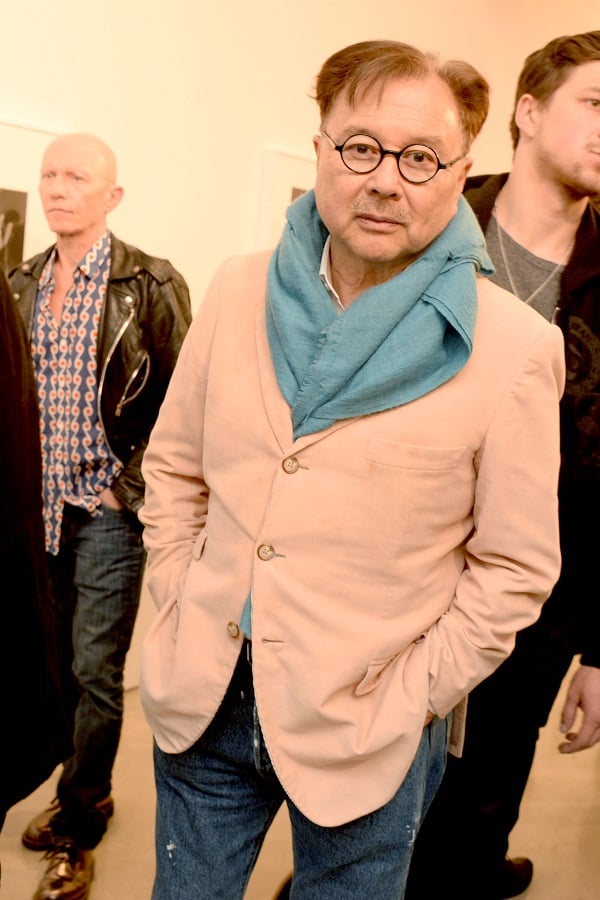Art & Exhibitions
Restauranteur Michael Chow’s Art Show in Beijing Is Anything But Saucy
What do making art and making food have in common?

What do making art and making food have in common?

As a first-generation Chinese immigrant to the UK, Michael Chow has done very well. New York magazine hailed the restaurateur’s franchise Chinese restaurant business, Mr. Chow, as a “hyper-stylish empire.”
Chow likes celebrity, serving his tasty fusion food to boldface names who in turn like him. He is often seen in fashion magazine photographs and is respectfully known as “Mr. Chow” among peers. Yet the Chinese are unfamiliar with Mr. Chow, for he has never engaged with China as a businessman or chef.
But this year, the 76-year-old Mr. Chow returns to his birth country—as an artist.
“I’m coming back for my father,” he told artnet News.
In a sharp suit and fine British accent, Mr. Chow hopes to present his “Chinese artistic spirit,” as he calls it, with his debut solo exhibition in China. Chow’s art shows a steady flow of explosive inner power which he traces back, he says, to his father, Zhou Xinfang, creator of the Qi style (麒派) in Beijing opera.
The exhibition is titled “The Voice for My Father” and is arranged at venues in Beijing and Shanghai to coincide with what would have been Zhou Xinfang’s 120th birthday.
Mr. Chow calls himself a Qi-style artist, in reference to his father. He says he believes all art is about psychological communication, he says. “I never gave up pursuing the art of Qi style. For me it is a kind of expressionism and about creating moments. When I was in the restaurant business, I would make customers feel like they were coming to a Beijing opera. For example, the key to carrying plates and serving is the force and speed you ‘perform’ in front of the customers.”
Mr. Chow says he doesn’t think he’s “returning” to art, and says there are no conflicts between his identity as a chef and an artist. He started out in art [Chow graduated from the architecture program at Central Saint Martins College of Arts and Design in London] and has, he says, always thought of himself as an artist. Mr. Chow sums it all up with the word “patriotism.” His devotion to art, he says, comes from an emotional identification with Chinese culture and his lifelong struggle to succeed in a foreign country rife with racial discrimination. “I’m probably the most patriotic person. Whoever wants to challenge this, let the person come fight me and I will knock him out with tai chi,” Mr. Chow says. “Just kidding. I don’t know tai chi.”
Aside from your own work, there are many portraits of you done by famous Western artists included in your solo exhibition. How do these pieces relate to the show and the memory of your father?
There are three parts to the show: my works, the portraits of me done by my artist friends, and my father. All of them are very personal, but the more personal something is, the more universal it becomes. Think of the show as a collage of sorts, just like my art in which I place different materials together—rare elements like gold foil with common or everyday ones like eggs. My life and art are both collages.
You talk a lot about your father, Zhou Xinfang, and how his Beijing opera influenced you. What does listening to Beijing opera feel like for you?
I remember I was two years old the first time I went to a Beijing opera. I jumped out of my skin when I saw the Jing character. Beijing opera was scary! After that I stayed with my father for two weeks, eating together and watching him practice. I think it was a subtle influence.
What were the expectations you had for yourself when you took up painting again at the age of 73? Are there differences between the work you create now and the artworks you did more than 50 years ago?
The main difference now is that I believe I am a pretty good painter. My good friend, Jeffrey Deitch, complimented me on my work once and it felt good, so I kept on painting and love doing it. My art has never changed all that much. I follow what nature and god has in store for me. I still have the energy to climb up a ladder and work and when the day comes that I don’t, I will figure something else out.
You’re a celebrity now. What is your take on the relationship between fame, fortune, and art? Do you worry that people question your “integrity” as an artist?
I believe fame and fortune gave my art the wings to soar. The year I graduated from art school in London I was broke and starved for three days. No way could I create good art with no food! Some artists don’t like money, but all I want to say is I’m proud to be making art by standing on the shoulders of “Mr. Chow.” Isn’t this how the Chinese art world works? Art would have no place in an impoverished China.
Are you worried the art world won’t be open to accepting you?
I admit I’m at a disadvantage. People overseas are suspicious of my identity as an artist because the impression of me being a restaurateur is too deep. But it works as an advantage in China. Nobody knows what I used to do, and I can even use Qi style to communicate. So it’s all good!
Translated from Chinese by Olivia Yang.